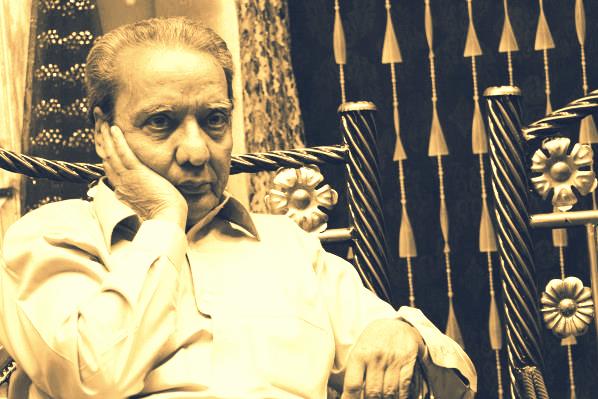Mohiuddin Nawab's Devta: a Contemporary Urdu Epic
- Komal Salman

- Aug 17, 2023
- 3 min read
Updated: Oct 28, 2025
Meet Mohiuddin Nawab, the mastermind behind the captivating saga of "Devta." Born on September 4, 1930, in Kharagpur, India, Nawab's literary legacy has left an indelible mark on Pakistani literature. He was not only a prolific novelist but also a screenwriter and poet, creating stories that continue to enthral readers to this day.
His journey was one of migration and adaptation. Following the partition in 1947, Nawab relocated to Dhaka, East Pakistan (now Bangladesh). However, the tides of fate led him to Karachi, Pakistan, after the fall of East Pakistan in 1971. This journey mirrored the ever-evolving nature of his tales, where characters navigate diverse landscapes and challenges.
Nawab's writing journey started under a female pen name, gradually evolving into his unique voice. His breakthrough moment came with the publication of "Ek Deewar, Ek Shagaf" in the film magazine "Romaan" around 1970. From there, he embarked on a remarkable 40-year journey as a regular contributor to Suspense and Jasoosi Digests.
At the core of Nawab's legacy is his magnum opus, "Devta," – the literary marvel that elevated the suspense genre to new heights. Its unparalleled success boosted Suspense Digest's popularity, making Nawab a literary powerhouse of his time. The saga spanned an incredible 33 years, captivating readers from February 1977 to January 2010, and later culminating in a 56-volume novel.

"Devta" is a gripping narrative that begins with Farhad Ali Taimur's life in a town on the outskirts of Lahore, Shahdara town. Farhad's extraordinary ability to delve into people's minds sets the stage for a spellbinding journey. The story unfolds with riveting encounters, pitting Farhad against formidable adversaries including local criminals, cruel politicians, landlords, influential families, and international organisations. The journey is both mesmerizing and tumultuous. As the tale progresses, layers of intrigue and conspiracy are unveiled, painting a vivid picture of Farhad's battle traversing continents, as Farhad evolves from a novice to a formidable force.
The epic introduces a captivating ensemble of characters. Whilst Farhad Von Shahdara stands at the heart of the narrative, there is also his potential-assassin-to-wife trope, with Madam Sonia. With Super Master, being controlled by the U.S. government, and Mask Man by Russia, two secret organisations, and several characters including scientists, superhumans, royalty, magicians, mythological deities, a Jewish Rabi, a family of Sufis, a Russian spy, a Japanese General, a Palestinian freedom fighter who doubles as an Israeli agent, the story is bubbling with international intrigue that transcends boundaries.
Powerful commentary which dismantles stereotypes is embedded in the epic now and again, with Marjana and Manjali, two powerful women who excel at martial arts, a warrior princess, Sabata, along with Romana, Pamilla, and Sheeba, whose powers range from telepathy to gymnastics, and Aahla Bibi, the leader of a spy group, the epic goes a long way to redefine feminine roles in Urdu fiction. Additionally, the character of Master Youshay's, the leader of the Master Group, both a mastermind and a victim adds a psychological depth that is unmatched. These unique and diverse characters, from various walks of life and corners of the globe, converge to create a literary experience that is unparalleled in Pakistani fiction.
"Devta" is more than a mere novel; it's a voyage into the unknown, a tapestry of mind-bending encounters and a testament to Nawab's unparalleled storytelling finesse. With the exception of serialized manga and anime comics, encountering a work of comparable magnitude within the realm of contemporary fiction is an exceedingly rare phenomenon. As readers immerse themselves in Farhad's telepathic world, they're transported to a realm where the lines between reality and fiction blur, and imagination knows no bounds.
Beyond "Devta," Nawab crafted nearly 600 diverse stories that graced the pages of prestigious digests like Jasoosi Digest and Suspense Digest. From romantic tales to historical epics, his creative range knew no bounds. Notable gems in his repertoire include "Kachra Ghar," "Iman Ka Safar," "Khali Seep," and "Adha Chehra." Nawab's literary brilliance wasn't confined to novels alone. He also penned scripts for movies, including "Jo Darr Gya Woh Marr Gya" (1995), showcasing his versatility as a storyteller.
In the realm of Urdu literature, Suspense Digest reigns supreme as the largest circulated monthly suspense magazine in Pakistan. It has been a member of the All Pakistan Newspapers Society since 1986, a testament to its enduring appeal. In addition to the iconic "Devta," Suspense Digest has graced literature enthusiasts with an array of literary gems. Among these treasures is "Marvi," another masterpiece by the talented Mohiuddin Nawab. A captivating journey awaits in "Moout Ke Sodagar" by Aqleem Aleem, a saga that unfolded from October 1984 to June 2006. "Anari" by Ahmed Iqbal weaves a tale of intrigue and discovery, while "Firoon" by Sheen Sagheer Adeeb delves into enigmatic realms. Prepare to be enthralled by "Nirwan ki Talash" and "Taloot" from the imaginative mind of MA Rahat. Anwar Siddique's contributions shine through "Darkshan" and "Kashkol," adding to Suspense Digest's offerings.









Comments